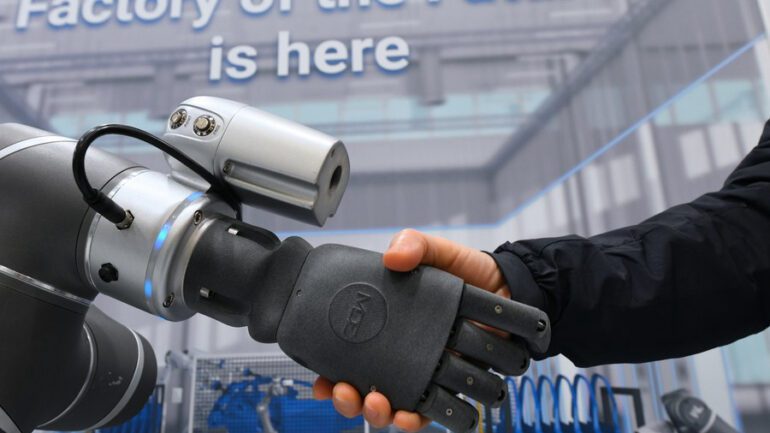TL;DR:
- China, the U.S., the EU, and 25+ nations signed the “Bletchley Declaration” for global AI cooperation.
- Wu Zhaohui, China’s Vice Minister of Science and Technology, emphasized the need for collaboration.
- The focus is on ethical AI development, setting shared standards, and avoiding regulatory chaos.
- China’s AI expertise is leveraged, and international cooperation is encouraged.
- The Bletchley Declaration offers a path to a secure AI future through collaboration.
Main AI News:
In a historic move, China, the United States, the European Union, and more than 25 nations have come together to address the growing concerns surrounding Artificial Intelligence (AI). This groundbreaking collaboration was formalized through the “Bletchley Declaration,” signed during the AI Safety Summit 2023 held in Britain.
China’s Vice Minister of Science and Technology, Wu Zhaohui, joined forces with leaders from the U.S. and the EU at the summit. Accompanied by prominent figures such as Tesla CEO Elon Musk and OpenAI CEO Sam Altman, Wu emphasized the imperative need for international cooperation in overseeing the responsible development of AI technologies.
Wu stressed that “countries, regardless of their size and scale, have equal rights to develop and use AI.” He further stated that China is committed to enhancing dialogue and communication on AI safety with all stakeholders, contributing to a global governance framework built on wide consensus.
The significance of the Bletchley Declaration cannot be overstated. With the rapid growth of AI technology, concerns have escalated regarding safety, security, and ethical implications. This collaborative effort marks a pivotal moment in history, with nations uniting to address these pressing challenges.
To fully realize the Bletchley Declaration’s objectives, Britain has a unique role to play as a mediator between the U.S., China, and the EU. By assuming this position, Britain facilitates communication and cooperation among nations with diverse interests and perspectives.
A Shared Commitment to Ethical AI Development
The ethical advancement of AI stands as a central pillar of the Bletchley Declaration. China, the U.S., and the EU all acknowledge the critical importance of ensuring that AI technologies adhere to human rights, ethics, and values. Establishing shared ethical standards is vital to prevent AI from being misused and causing harm to individuals and societies.
For instance, the European Union places a strong emphasis on the need for international cooperation in addressing “existential risks” posed by highly capable general-purpose AI models, often referred to as “frontier AI.” These models hold immense potential, but if not handled carefully, they could lead to significant problems. Collaborating with China allows for the pooling of resources to effectively identify and mitigate these risks, minimizing potential harm.
In the competitive landscape of AI, governments can work together to lead in AI regulation. While competition can foster innovation, it may also result in a disjointed and contradictory patchwork of regulations. Cooperative efforts to standardize regulatory approaches and standards can prevent a race to the lowest common denominator, safeguarding the larger objective of AI safety and security outlined in the Bletchley Declaration.
Leveraging China’s AI Expertise
China, as a prominent player in the AI sector, possesses valuable knowledge and expertise. Its active participation in international initiatives aimed at ensuring AI’s safety and security is pivotal. Collaboration fosters open communication across boundaries and ideologies while deepening the understanding of AI capabilities.
The European Union has prioritized concerns related to data privacy and surveillance in its AI governance. However, these concerns are shared worldwide. Collaborative efforts can help in developing frameworks that balance the interests of various stakeholders, including China, the U.S., and the EU, with EU ideals when addressing privacy and surveillance matters.
Balancing regulation and innovation is a delicate task. Striking the right balance within an international framework is crucial. Wu reiterated China’s willingness to contribute to such a framework with global participation, signifying a paradigm shift towards international and cross-border AI cooperation among nations of varying sizes.
Cooperation for a Secure AI Future
Cooperative action is imperative in curbing the unchecked growth of AI systems. It underscores the global significance of AI safety and establishes China’s commitment to an international vision. This approach allows each participating party to bring unique insights and capabilities to navigate the challenges of AI governance that transcend borders and ideologies.
The Bletchley Declaration offers a promising path toward shared objectives in the realm of artificial intelligence. In a world often dominated by tensions between major players like the U.S., China, and the EU, this collaborative effort represents an opportunity to combine forces, exchange knowledge, and align strategies. Together, these economic powers can steer the future of AI towards a more secure and safe trajectory.
Conclusion:
The Bletchley Declaration signifies a significant milestone in the AI market. Global cooperation among major players like China, the U.S., and the EU emphasizes ethical AI development and regulatory standardization. This collaborative approach is poised to shape the AI landscape, promoting safety and security while fostering innovation and international dialogue. It opens up opportunities for businesses to engage in a more stable and globally aligned AI market.

